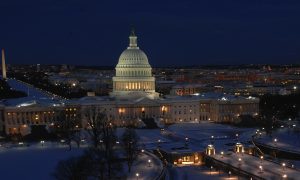 The official shutdown of US government functions will affect the vaping industry chiefly through the closure of the Food and Drug Administration (FDA). And as long as the shutdown doesn’t drag on a long time, regulatory oversight of tobacco may continue – paid for by fees from the industry.
The official shutdown of US government functions will affect the vaping industry chiefly through the closure of the Food and Drug Administration (FDA). And as long as the shutdown doesn’t drag on a long time, regulatory oversight of tobacco may continue – paid for by fees from the industry.
The federal government remained closed down over the weekend and into the new working week after the Senate and the president were unable to reach a budget agreement by midnight on Friday.
However, a budget for the FDA shows that work done on the authority of the Tobacco Control Act, which encompasses the vaping market, is financed through user fees. This should mean that its work will continue despite the closure of many other government programmes.
It is not clear, given the restriction of resources, whether the agency will go ahead with the public hearing on Philip Morris International (PMI)’s IQOS heated tobacco product, scheduled for later this week, when the Tobacco Products Scientific Advisory Committee (TPSAC) will hear submissions related to the modified risk tobacco product (MRTP) applications for IQOS.
In the absence of any specific notices of cancellation, however, one might assume the meeting will go ahead.
All in all, it seems the FDA may not feel the brunt of this shutdown to the same degree that other agencies may. Because of the structure of the agency’s funding for tobacco regulations, it may allow Center for Tobacco Products (CTP) to float on user fees for a while.
Critical services
This is the first time since 2013 that the federal government has been officially shut down, with all “non-essential” federal employees placed on unpaid leave.
A 2013 article from the Food Safety Network reported that the FDA laid off about 45% of its staff as part of that year’s shutdown. But almost all of those put on furlough dealt with food, not drugs, shutting down food inspections and closing off other services. Inspectors at the FDA were “asked to turn in their government cell phones and not even check their work email until Congress [passed] a budget”, according to that report.
The news site Politico reports a contingency plan to keep about half of the agency’s staff active. A staffing plan on the Health and Human Services (HHS) department website seems to corroborate this.
Now, as in 2013, it seems as though the FDA’s drug operations will largely remain relatively unaffected.
FDA Commissioner Scott Gottlieb tweeted that the agency “currently has access to carryover user fee funds that allow us to continue to review/approve some types of medical product applications”. Gottlieb also stated that the agency’s current shutdown plans have about 58% of staff remaining active, with 42% furloughed. This is an increase from the last shutdown.
A statement on the FDA website further enumerates a host of services they deem highly critical and which will continue. It adds: “In addition, the FDA will continue to support activities funded by carryover user fee balances, which allows us to continue to bring new therapeutic options to the patients that need them. However, during the lapse period, the FDA will not have legal authority to accept user fees assessed for FY [fiscal year] 2018 until an FY 2018 appropriation for the FDA is enacted. This will mean that the FDA will not be able to accept any regulatory submissions for FY 2018 that require a fee payment and that are submitted during the lapse period.”
What This Means: Though some of the specifics of the FDA’s operations need to be verified in the current government shutdown, it seems likely that regulations on the e-cigarette market, and related operations, will move ahead on the strength of user fees.
– Daniel Mollenkamp ECigIntelligence staff
Photo: 12019






